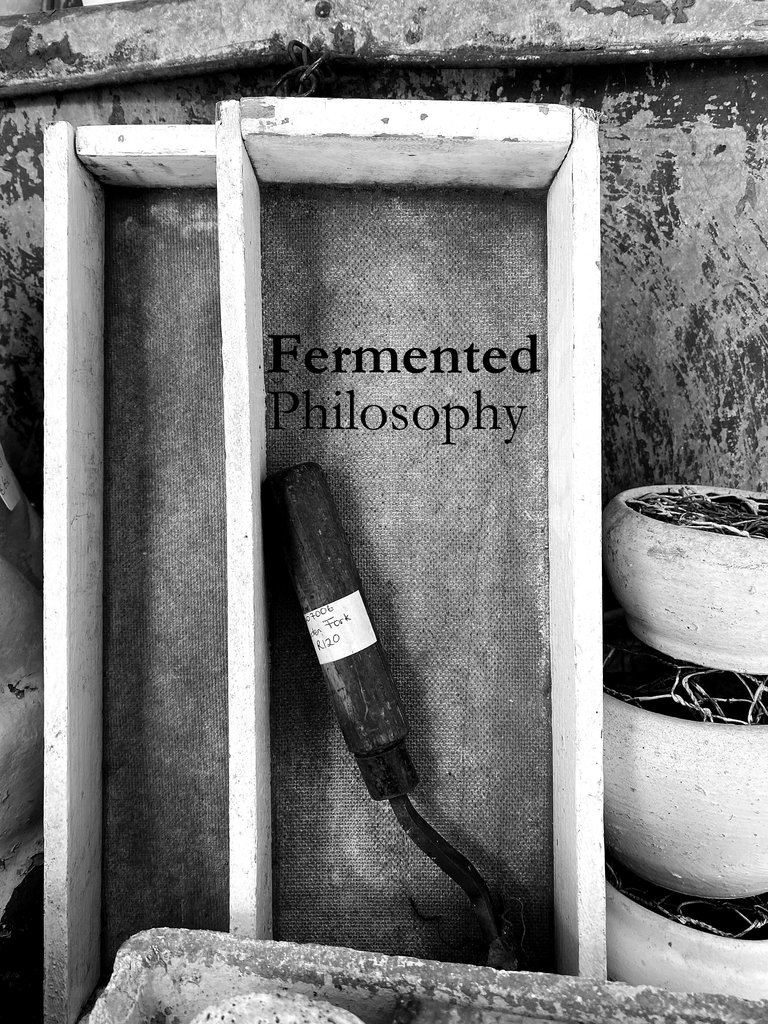Fermented Ph.D. Dump: Philosophical Practice as a Method to Philosophize

Introduction: Fermented Ph.D. Dump
I am currently writing three important chapters in my Ph.D. and with time running out before the deadline I am crunching so much into a small timeslot. My brain is literally bleeding with everything I am writing and reading. Alongside this, I am currently writing an article for a peer review journal, editing an article for another journal, writing various abstracts for seminars, and preparing to help with the African philosophy module at the university I am doing my Ph.D. Wow, that was a mouthful.
In any case, with all this writing, editing, and reading I felt compelled to dump something here. I hope you can get some insight into philosophizing and the process behind it. But another reason I dump here is to clarify my own thoughts. Sometimes they get cluttered and I just need to dump them somewhere. Above you will see the links to the other two dumps I have done here. I hope that throughout the years there will be many links.
Introduction: Philosophical practice as a method for philosophizing
Many people still think that philosophy is merely an academic enterprise or practice. That is, people still hold the notion that philosophy is an abstract practice devoid of human emotions and contextual factors. The philosopher is someone who is not affected by emotions, feelings, and everything that can be seen as contra-rational. Some philosophers, as I mentioned in the previous dumps, state that the subject in modern western philosophy is wholly devoid of human characteristics. This is important because it keeps the conversation in such a manner as to situate it in a universal and value-neutral manner. Moreover, it can thus claim to be "objective".

But modern philosophical counselors often make the claim that philosophical practice, that is, praxis, or the practical instantiation of philosophy, challenges this whole abstract and supposed value-neutral practice of philosophy. However, as soon as they make this claim, the question arises:
"What method does the practical philosopher use?"
Various answers have been given to the seemingly innocuous question. There is no method (says Shlomit Schuster and Gerd Achenbach), there is one method (says Eliot Cohen), or there are various methods (says Peter Raabe). But one answer that has not been given is that philosophical practice is itself a method of practicing philosophy, i.e., philosophizing. I have not found any philosophical counselor holding this position. Now, this leads to another question when one looks at what a method is. If one accepts a method to being something akin to repeatable steps one takes to achieve a desirable outcome, philosophizing throws a metaphorical spanner in the works.
That is, philosophizing as a method does not take repeatable steps, nor is there a desirable outcome as such.
This is because philosophy proper is in essence unpredictable and does not necessarily move toward a goal. Philosophizing as an activity does not have an outcome or goal in mind, nor are there steps one can take to practice philosophy as such. If one merely looks at the history of philosophy, one is struck by how many different methods there are. Kantian philosophy is relatively antithetical to Nietzschean philosophy, both these are antithetical to African or Chinese philosophy. African and Chinese philosophy is also not coherent traditions with one practice or method. Both these traditions have many different schools linked to them, sometimes contradictory in nature.

A New Method in Philosophy
My opinion, thus, is that philosophical practice is not a separate school of thought with its own methods and goals, and problems. Instead, it instantiates a new method in the whole tradition of philosophy. Various manners of philosophizing exist. Rather than see philosophical practice as a practice that utilizes different methods, philosophical practice becomes a method in itself. One cannot, consequently, talk about different methods in philosophical practice. It will be nonsensical. Instead, one can say that different philosophical schools can use philosophical practice to in some sense make the abstract practical for the everyday person on the street who is not well-versed in philosophy.
For example, currently, philosophical practice is viewed as a separate practice from that of abstract academic philosophy. Those in the academy produce abstract theoretical work that does not affect the general public. Philosophical practice, on the other hand, claims that it is busy with practical work that might influence the general public to live a more fulfilling and deeper life. Both are said to have different methods. But this is where a problem arises: academic philosophy locks itself in an ivory tower whilst practical philosophy becomes a variety of psychotherapy or other talk therapies. Some have claimed that philosophical practice simply is a form of psychotherapy, Jon Mills being the most prominent figure claiming this. Others want to claim that philosophical practice is not psychotherapy, not academic philosophy. Ran Lahav is the most vocal proponent of this variant. But this leaves the clear gap: Why is philosophical practice not wholly academic philosophy? It is just a variant in terms of method. That is, it is academic philosophy but merely a method of practicing academic philosophy in such a manner as to make its theoretical work more practically applicable. Think of theoretical and practical mathematics and science.

Implications of this Move
One might now rightfully wonder: What is the implications of this move? For one, it ends the search for methods. That is, it ends the debate on whether philosophical practice needs methods. This is in my view a great benefit because the whole debate on whether philosophical practice needs a method rests on the fallacious thought that it itself is not a method. That is, by not seeing itself as a method, those practicing philosophy wholly entertained the idea that they can produce new methods. Taking a metaphorical step backward, the philosophical practitioner can thus see that separating theory and practice in such a manner as to claim it to be two different fields is mistaken.
Moreover, it also benefits those who are not in the academy as it exposes them to current philosophical problems and answers. Whereas when the two are separated a false belief sets in that they are busy with new work, something separated from academic philosophy. In my view, when philosophical practice is seen as a method of academic philosophy the layperson can learn more about his/her current situation.
But this necessitates that academic philosophy is in touch with current problems in life. And currently, this is not the case. Various academic philosophers are wholly drenched in problems not relatable to the local environment. One might see the academic philosopher as a weed in the garden that is not indigenous. Yes, it might be beneficial in some ways, but in others, it is not. It is not "from here" or local. It is alien in nature. But it is still a plant, something living. It is not alien in the sense that it is mechanistic or "out of this world". It is still from this world just from a different place.
Postscriptum, or From Here We Talk
In the next post, I will talk a bit more about space and place and the notion of "here". It is really interesting stuff. Even for the layperson.
All of the images are my own, taken with my iPhone. The musings and writing are also my own unless stated otherwise (by hyperlinking it). Please comment your opinion, if you are opinionated! Otherwise, I hope you enjoyed this lengthy piece. Stay safe, and be well.
Its been a while that i dont read your dumps!! Thanks for this thoughts
!1UP
Thank you so much! Indeed, my work and research has been keeping me so busy. Glad you enjoyed it!
You have received a 1UP from @gwajnberg!
@stem-curator, @vyb-curator, @pob-curator
And they will bring !PIZZA 🍕.
Learn more about our delegation service to earn daily rewards. Join the Cartel on Discord.
I gifted $PIZZA slices here:
@curation-cartel(17/20) tipped @fermentedphil (x1)
Join us in Discord!
Congratulations @fermentedphil! You have completed the following achievement on the Hive blockchain and have been rewarded with new badge(s):
Your next target is to reach 4000 replies.
You can view your badges on your board and compare yourself to others in the Ranking
If you no longer want to receive notifications, reply to this comment with the word
STOPCheck out the last post from @hivebuzz:
Support the HiveBuzz project. Vote for our proposal!